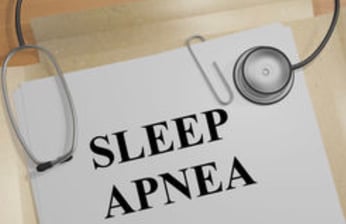 Sleep apnea occurs when you have obstructions in your airway that interfere with your breathing during sleep. The flow of air can be partially blocked or even completely stopped altogether. It is common in older adults, affecting as many as 53% of men and 26% of women.
Sleep apnea occurs when you have obstructions in your airway that interfere with your breathing during sleep. The flow of air can be partially blocked or even completely stopped altogether. It is common in older adults, affecting as many as 53% of men and 26% of women.
Patients with sleep apnea were, on average, diagnosed with mild cognitive impairment nearly 10 years earlier than those who didn't suffer from breathing problems during sleep.
Disturbingly, it’s also becoming more prevalent among children. By preventing deep, restorative sleep, sleep apnea can have serious ramifications for your child’s mental functioning as it has been linked to adverse brain changes that can affect behavior and cognition.
Estimates suggest that up to 5% of children are affected by sleep apnea and an even larger percentage of children may be susceptible to sleep-disordered breathing. In one study, it was concluded that sleep disordered breathing is a relatively common condition in 8- to 11-year-old children and, interestlingly enough, potentially vulnerable subgroups, black children, and former preterm infants, are at increased risk.
The condition causes the child's airway to become blocked, which ultimately causes the brain to go without oxygen for short periods of time and may wake the child up.
According to recent research, children with sleep apnea display troubling brain changes in areas involved with thinking and problem solving. These areas were found to be smaller in those with sleep apnea compared to children without sleep apnea.
In the study, researchers used magnetic resonance imaging to analyze the volume of children's gray matter, which is the outermost layer of the brain that allows for higher levels of functioning like problem solving. They compared brain scans from 16 children with sleep apnea and 200 children without sleep apnea (all the children were between 7 and 11 years old). Overall, children with sleep apnea had decreases in gray matter volume in areas of the brain important for controlling cognition and mood, compared to the other children.
Studies have also shown that kids with sleep apnea tend to struggle more in school and perform worse in language arts, math and science compared to those who do not have sleep or breathing problems, scoring on average 11% lower on academic tests.
If you suspect your child has sleep apnea, your first step would be to contact a qualified sleep specialist. If your child is obese, losing weight might also significantly improve the problem. If the sleep apnea is related to tongue or jaw position, which is common, specialty trained dentists can design a custom oral appliance to prevent the condition from worsening.
For questions or comments, please complete the form below.
